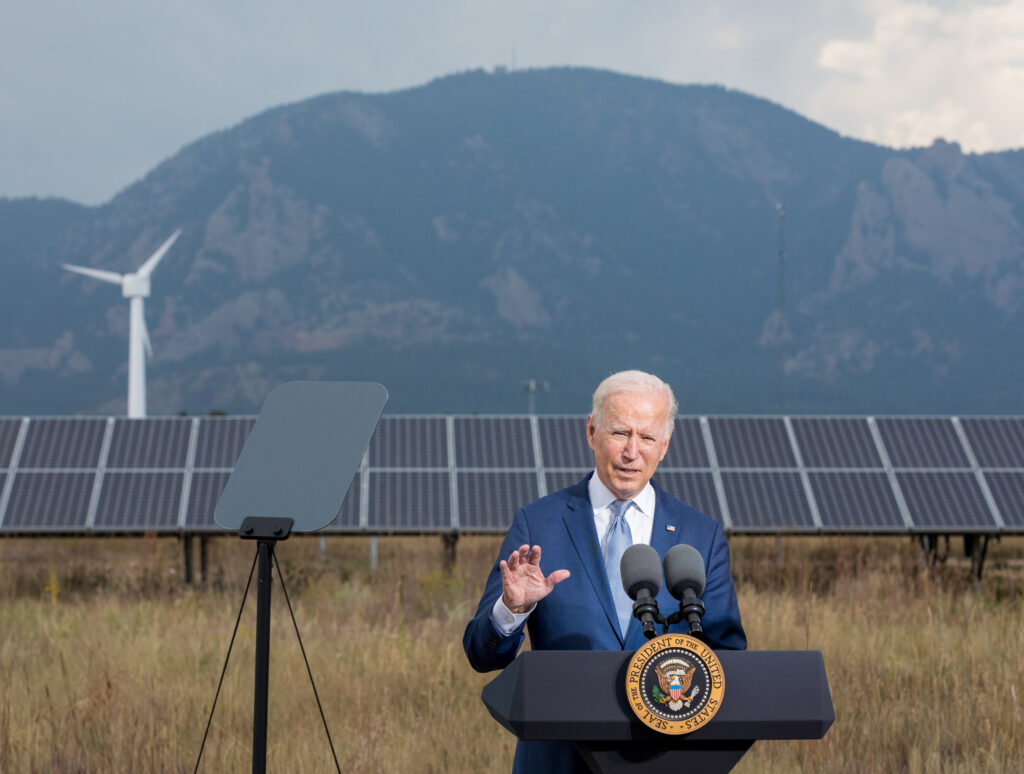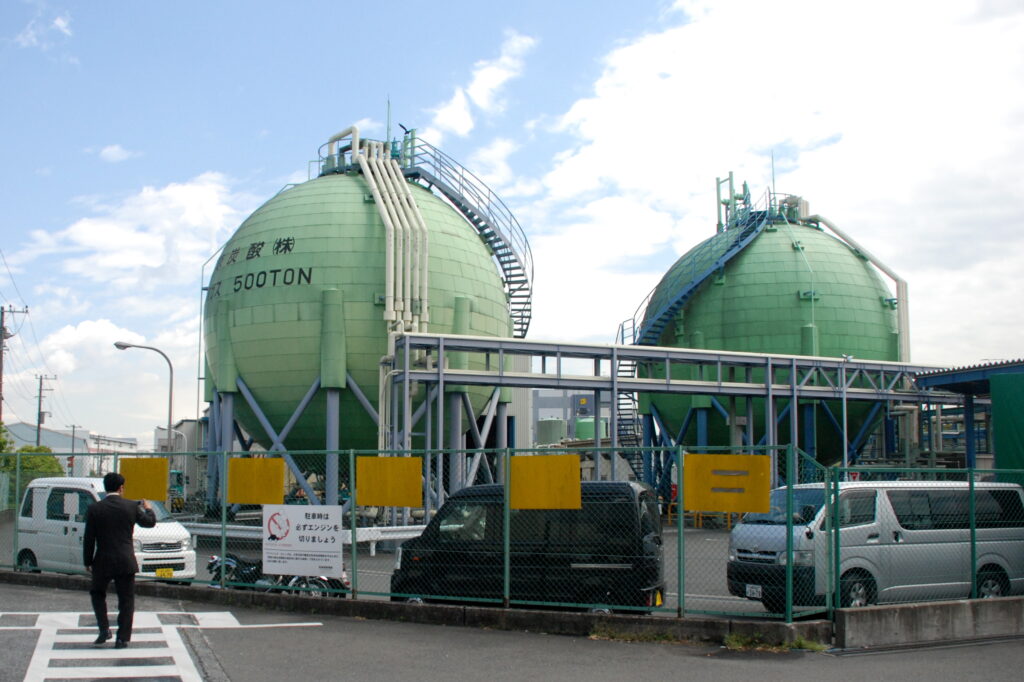On 26 January 2024, the Biden administration, by executive order, instituted a temporary suspension of authorizations for liquefied natural gas (LNG) exports to non-Free Trade Agreement (FTA) nations. According to the White House, the measures were intended to provide the US Department of Energy with time to review and update its criteria for LNG exports, a process that has not occurred in over six years.
The move comes at a unique moment for the international energy sector, as the US erupted onto the global stage last year as the world’s largest exporter of LNG. Among the nations dependent on the US for this product and without FTAs, many are situated in Europe and East Asia. Here, respective crises like the Ukraine war and rising maritime tensions have contributed to a volatile energy market. In Western Europe especially, the US’s LNG has proven integral to the region’s efforts to wean itself off of Russian natural gas in the wake of Putin’s invasion of Ukraine. A pause in LNG exports could jeopardize attempts at energy independence.
Still, the pause also comes as the debate over the environment rages on in the US and around the world. Premature resumption of LNG exports, the Biden Administration warns, could undermine progress made in transitioning towards cleaner energy supplies and eliminating waste.

US energy’s conflicting realities
The Biden Administration has lent the environment, green energy, and minimizing fossil fuels unprecedented attention in his policy agenda. Indeed, the White House itself refers to President Joe Biden’s priorities as involving the “most ambitious environmental justice agenda in [American] history.” Biden has sought to realize this ambition through a twofold strategy of action.
The first aspect of that strategy is increasing investments in the emergent green energy and technologies industry. Last year alone, the administration appropriated significant funds for the development and implementation of green technologies across the US. For instance, USD 20 billion was reserved for grants for green companies while USD 7.5 billion was put towards charging for electric vehicles. Additionally, the Biden Administration has hosted a series of competitions for green technologies and, in 2023, launched the American Climate Corps: a training program for young Americans intended to prepare them for jobs in the clean energy and agriculture fields.
In addition, the Biden Administration has simultaneously exercised its executive power to hamper fossil fuel development. In June 2021, for example, the administration revoked a key permit for the Keystone XL oil pipeline; a USD 9 billion initiative from 2017 that was forecasted to transport 830,000 barrels of oil a day across the nearly 1,931 km between Alberta, Canada, and Oklahoma, US. More recently, in September 2023, Biden’s administration nixed about 7.9 million hectares of Trump-era land leases in Alaska for gas and oil companies to protect the Arctic National Wildlife Refuge, which would’ve been otherwise affected by fossil fuel exploitation in the area. Furthermore, the administration has attempted to introduce regulations on domestic methane emissions per agreements made with other nations at previous COP summits.

Both prongs of this strategy appear to serve the administration’s larger objective of making 80 percent of all American energy green by 2030. Yet, such lofty ambitions have been put on hold by shifts in the US energy market that appear to favor fossil fuels.
Notably, in 2023 the US surpassed both Qatar and Australia to become the world’s largest exporter of LNG after annual net exports rose 14.7 percent to 88.9 million tonnes. This explosion in exports was partially due to the opening of two major LNG production facilities in the past year: the Freeport LNG complex in Houston, Texas, and the Calcasieu Pass facility in Southwest Louisiana. However, the growth was also driven by international crises that have considerably amplified foreign reliance on US LNG. In 2023, the US’s largest customer remained the European Union; it received 68 percent of all US LNG exports in November, for example – a result of the EU’s desire to shift away from Russian natural gas after the Russian invasion of Ukraine in February 2022. Similarly, China and Japan, two of the US’s largest customers in East Asia (the second-largest market for US LNG), have faced regional uncertainty that has promoted greater energy (and thus LNG) demand.

Moreover, the US also recently became a ‘net energy exporter’, meaning the nation exports more energy overall than it imports. This change, along with the US’s novel dominance of the global LNG trade, has led many Republicans and Southern leaders (where LNG production is most prominent) to promote the economic opportunities associated with energy exports. In fact, it has been reported in Congress that the LNG industry could create half a million jobs by 2040. Still, at the same time, many environmentalist groups and certain members of the Democratic Party have criticized the US LNG expansion as contradicting the Biden Administration’s promises on the environment and clean energy. In November 2023, 60 environmentally oriented lawmakers demanded action and called upon the administration to review US exports of LNG.
Biden makes a move
In January 2024, the Biden Administration took an important step. President Biden announced by executive order that the US would suspend further exports of LNG to non-FTA countries. These include all nations in Europe; all of East Asia save for Malaysia, Singapore, Brunei, and South Korea; and most of South America and Africa. Specifically, he did so by targeting the approval process before any LNG contract is obtained and fulfilled.
LNG, its development, and its international exchange are all largely governed by the Natural Gas Act of 1938 (NGA). According to the NGA, corporations and individuals interested in exporting or importing LNG must obtain proper authorization from the Federal Government. Until today, the authorization power for LNG site construction has rested in the hands of the Federal Energy Regulation Commission (FERC) while the authorization power for import-export rights is conferred to the Department of Energy (DOE), which also has the power to modify the terms of potential import-export contracts for LNG.

The standard upon which LNG contract approval, modification, or rejection occurs is defined ambiguously as ‘the public interest’ — a designation that is presumed for all FTA countries and which has not changed since it was first introduced in 1938. The DOE has previously attempted to provide more detailed guidelines for its review process of LNG contracts and to habitually revisit such guidelines to ensure they reflect the contemporary ‘public interest’. Today, the DOE predicates its assessment of the public interest on financial and environmental studies of the impacts of LNG.
President Biden’s order contends that both studies currently being used in the authorization framework are outdated, having last been collected in 2018. Since then, the White House says, there has been significant change in both the climate crisis and the demand for LNG that obligates the US and DOE to reconsider the current authorization process.
Accordingly, the executive order institutes a temporary pause on new authorizations for most pending LNG import-export contracts. The language of the executive order emphasizes that the suspension is temporary. Yet, the specifics of any timeline for this revision process have not been publicized. Secretary of Energy Jennifer Granholm disclosed in an interview that the process will probably take months for the DOE to complete, followed by additional time for the public to comment on the new criteria. The executive order and DOE eagerly clarified, however, that during the pause, neither export capacity for LNG companies (which currently sits at 1.4 billion cubic meters per day) nor the construction of new LNG sites would be affected. This is because the domestic expansion of LNG capabilities is under the purview of the FERC, not the DOE, and the former organ is not subject to the same criteria for authorization as the DOE.

Furthermore, the executive order also makes three exceptions to the suspension. The first is for FTA countries, as the trade of any product with these nations is presumed to be in the “public’s interest,” regardless of how that is defined. At present, 20 countries have an FTA in force with the US, and in 2023, 11.7 percent of all LNG exports (or 1.32 billion cubic meters) went to FTA nations. Thus, the export of LNG to these select countries will continue as normal. Secondly, the executive order also has a national security clause built into it. According to this measure, the pause could immediately cease and LNG exports resume if the federal government determined that there was an imminent threat to national security as a result of the executive order. Finally, the executive order halts LNG exports that are pending authorization: LNG exports that the DOE has already approved are still expected to occur, which encompasses tens of LNG projects. Thus, some non-FTA countries will continue to receive US LNGs in the coming months, though the volume of these exports has already begun to decline.
Congress and concerns
Thus, President Biden has seemingly leveraged the DOE’s LNG-export authorization procedure and the weight that process affords environmental studies as a backdoor to modifying the US’s LNG situation on the whole. Still, several concerns exist around the President’s actions, and the fallout both domestically and abroad has been evident.
For one, though the suspension of LNG export is purportedly temporary, any protracted exit of the US from the global LNG trade would likely create a vacuum in regions that rely heavily on the US for the product, namely Europe and East Asia. The US has been key in helping the EU halve its reliance on Russian natural gas since the invasion of Ukraine in 2021. The current European LNG stores stand at 97 percent full, and as a result, President of the European Commission Ursula von der Leyen’s office released a note countenancing Biden’s executive order on the grounds of climate change. Yet, it’s unclear whether this support will last when EU LNG storage eventually dwindles. Indeed, major European energy companies (such as German-based gas corporation Uniper) have warned that if the suspension of LNG exports continues into the long term, the European energy market will be adversely affected by a supply vacuum, motivating a return to Russian gas and crippling EU energy security.

In East Asia, the US’s second-largest market for LNGs, there is also concern that a failure to address Japan’s energy needs (which relies on the US for over 35 percent of its annual energy) would push it and other countries toward different suppliers, most likely Qatar or Australia. In both cases, the entrance of non-US LNG suppliers, beyond impacting the US’s foreign policy, may have significant environmental consequences. US LNG is generally cleaner than popular alternatives. Tight regulations on LNG production and transportation in the US preclude much methane (a potent pollutant) from leaking, whereas the comparatively laissez-faire processes of Russian and Qatari oil development engender more methane production. Providing the latter parties with a greater market share may contribute negatively to any international efforts against the climate crisis.
Finally, beyond energy independence, the suspension of US LNG export authorizations has brought attention to the longevity of the LNG trade. Specifically, many politicians in the US have taken issue with the executive order because they claim it hampers the explosive growth of the LNG industry which has taken place over the last decade; growth the House of Representatives (HoR) predicts could generate more than USD 73 billion in capital between 2025 and 2040. However, despite current demand for LNG, many US trading partners in Europe, East Asia, and elsewhere have set ambitious green energy goals that generally involve a declining reliance upon all fossil fuels, including LNG. Japan’s Strategic Energy Plan, for instance, lowers the country’s LNG consumption to 20 percent by 2030. Similar initiatives have emerged throughout the EU. The executive order’s pause on LNG exports has thus raised the question of whether LNG expansion is a prudent course of action, or whether US energy investments and infrastructure should be focused elsewhere.
The culmination of these worries over Biden’s executive order has come in the form of a Republican-led bill entitled “The Unlocking Our Domestic LNG Potential Act” (UDLNGPT). The bill would lift the suspension on LNG exports by stripping the DOE of its authorization power and gifting it to the FERC, which is non-partisan by nature. So far, the bill has passed the HoR with a vote of 224-to-200, indicating possible bipartisan support for the measure, and it is now being hotly debated in the US Senate.

Implications for Governments
- Energy policy re-assessment: Given the executive action’s failure to outline when US LNG export authorizations will resume, governments may re-evaluate their domestic energy policies to mitigate the repercussions of a possibly prolonged US exit from the LNG trade. This process will be especially likely in regions disproportionately reliant on the US for LNG and where imported LNG accounts for a significant portion of the energy supply. To these ends, governments could consider bolstering extant promises to shift away from LNG or other fossil fuels and toward alternative, sustainable energy sources. Additionally, they may also investigate fostering greater trade with other major LNG producers such as Qatar or Australia to fill the vacuum, bearing in mind the environmental consequences.
- Market impact: Governments, including the US government, will need to conduct detailed economic analyses to determine the impact that suspended authorizations for US LNG exports could have on their economies. Studies should afford special attention to energy-intensive sectors, green energy and technologies, and the LNG sector itself. In doing so, governments can position themselves to make more informed policy decisions around energy, reduce the effects of the executive action on domestic industries, and better prepare themselves to address any future changes to the global energy trade.
- Exploring FTAs: The exception to Biden’s policy for FTA nations has emphasized the value of that status for minimizing volatility in trade with the US Governments may consider pursuing an FTA with the US to revive LNG imports from the US despite Biden’s decision or insulate them against future paradigm shifts in US policy.
- Monitoring US policy: The domestic movement that has erupted against Biden’s order and its bipartisan support suggest that the US may not be prepared for such a dramatic shift away from LNGs or more broadly, fossil fuels. Accordingly, monitoring the development of the Republican-led bill in the Senate and any response from the Biden administration could serve as barometers for popular attitudes in the US on energy and how that may inform future policy.
Implications for Private Firms
- Risk assessment: Before 2024, the US’s LNG industry experienced meteoric growth and incredible investment. Biden’s order is expected to hurt what has been a robust and financially attractive domestic sector as well as possibly shift the global LNG trade long-term. Thus, firms significantly reliant on US LNG to operate or who are financially involved in US LNG are compelled to host internal analyses of their business operations. Specifically, companies should study minimizing the impact of this LNG export suspension on their supply chains.
- New investment opportunities: With the US withdrawing from much of the LNG trade, foreign governments may shift their energy policies and increase focus on green energy or expanding LNG imports from non-US sources. To adapt to the changing energy landscape, private firms may consider investing in green energy technologies and infrastructure, such as renewable energy, energy storage, and carbon capture and storage. More broadly, private firms should also closely observe how their government responds to Biden’s policy in the coming months to best capitalize on any resulting policy changes and help establish their market prudence.
Taking the lead: Companies could engage with governments and industry associations to advocate for policies that support their interests, such as the resumption of LNG exports or the development of alternative energy sources.

